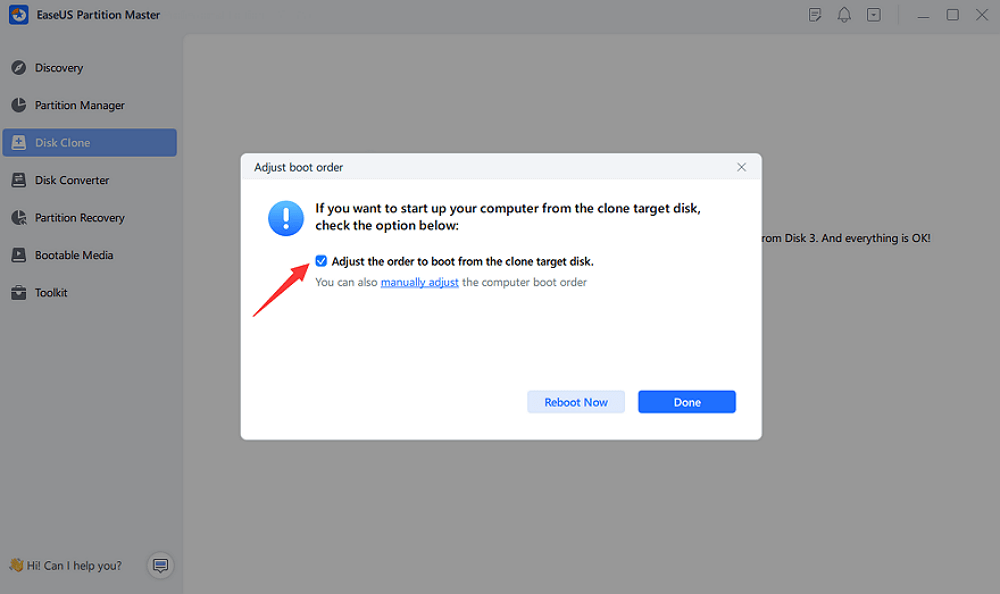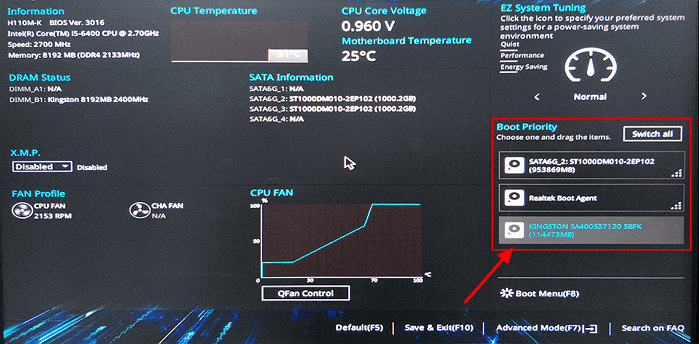Start Your Free Trial!
Sign up to our newsletter, stay updated on news and exclusive offers from EaseUS. Don't worry, if you change your mind, you can unsubscribe at any time, free of charge. We value your privacy (Privacy Policy).
Move Games to Another Drive/PC
Featured Articles
In setting up or upgrading a Gaming PC, 4 essential factors heavily affect the gaming experience: GPU/CPU, RAM Memory, Graphic Card, and the Gaming Disk. Suppose that you've got a compiling gaming PC with a powerful gaming CPU, a super fact graphic card, the correct amount of memory car, and even the just right motherboard. You've come to the last step - picking up a qualified disk.
While selecting a gaming disk, here are two factors that you need to consider:
To make it clearer for you, continue reading, and you'll get answers to all these questions in your mind here.
In this article, you'll learn:
Here we'll compare HDD and SSD to help you quickly understand which is better for gaming with the following factors:
| Comparison | HDD | SATA SSD | M.2 SSD | NVMe SSD |
|---|---|---|---|---|
| Read Speed | 80-160 MB/S | 550 MB/S |
|
|
| Write Speed | 80-160 MB/S | 520 MB/S |
|
|
| Lifespan | Longer | Shorter | Shorter | Shorter |
| Reliability | Lower | Higher | Higher | Higher |
| Price |
|
|
|
|
According to this comparison table, it's clear that SSDs are much faster than HDDs in both reading and writing data. Also, the price for HDD and SSDs is not much different in 250GB and 1TB storage capacities.
According to most PC game lovers, we also get this conclusion that is comparing HDD and SSD as their OS disk in Gaming PC that SSDs are:
So, we suggest that you pick SSD for a Gaming PC for its faster and more reliable. Share this article and let more users know that they should choose HDD or SSD for gaming.
You may also want to know the differences among SATA, M.2, and NVMe SSDs, right? Let's list them here again to help you see the differences more clearly.
Check the comparison table, and we can see the major differences among these three types of SSDs:
| SSDs | Read Speed | Write Speed | Price |
|---|---|---|---|
| SATA | 550 MB/S | 520 MB/S |
|
| M.2 |
|
|
|
| NVMe |
|
|
|
With higher prices in M.2 and NVMe SSDs, M.2 and NVMe SSD with PICe connectors are even faster than the SATA SSD. Besides, you can see more differences between AHCI and NVMe.
AHCI VS NVMe: Should I Upgrade AHCI to NVMe?
So, what are the advantages of NVMe SSD over AHCI mode SSD? Should you upgrade from AHCI SSD to NVMe SSD?

So will they be the difference while loading games? Here is an example of a gaming benchmark test over 120 SSDs from TweakTown, check the image here:

From Tweaktown, Best SSD For Gaming: Over 120 SSDs Tested
From the test, you can see that there is a difference between SATA and NVMe/M.2 PICe SSDs. 3/4 of the charts are PICe SSDs, and the actual difference in game loading times is within 3 seconds.
Also, from a test of Linus Tech Tips, gamers and geeks see clear differences while loading games, but they didn't see much difference while playing games and witching maps. Here is their test video, and let's take a view:
From Linus Tech Tips, Does a Faster SSD Mater for Games?
Summary: According to the comparison table, Tweektown and Linus Tech Tips' tests, there an obvious that M.2/NVMe with PICe connectors are faster in booting PC and loading games than SATA SSD. However, there's no big difference when it comes to the gaming experience. Players can barely feel the slight changes.
So, does SSD speed matter for gaming?
How to Pick the Right SSD for Gaming? Take these three factors into consideration, and you'll know which type of SSDs suits you the most:
Extended Reading: Is RAID 0 SSD Worth It for Gaming
So now you've got an ideal SSD for gaming, it's time to set it up on your gaming PC. We'll guide you through this here in this part.
Following here is the complete process that you can directly try on your computer:
Step 1. Remove the gaming PC case with a screwdriver.
Step 2. Connect the SSD to PC:
If it's an SATA SSD, plug the SATA-power cable between your SSD and motherboard on your computer.
If it's a PICe M.2/NVMe SSD, locate the SSD lost, remove the mounted screws, push the SSD into the slot, and secure the SSD with screws.
After this, close the computer case and restart your PC.
Once you install the SSD, you need to open Disk Management and initialize the SSD in this way:
Step 1. Press Windows + R keys, type diskmgmt.msc, and hit Enter to open disk Management.
Step 2. Locate and right-click on the SSD, select "Initialize Disk" and set "GPT" or "MBR" as the disk type.
Note that your new SSD should share the same disk type as the OS drive.
Once done, it's time that you transfer OS from the old disk to the new SSD on your gaming computer.
To ensure that you enjoy a smooth gaming experience on your PC, you need to transfer the OS and games to a new SSD.
EaseUS Partition Master with its Migrate OS feature can fully help you out.
Here is how to do so:
Steps to migrate OS to HDD/SSD:
"Reboot Now" means to keep the changes instantly, while "Done" means you need to restart the computer later manually.

Note: The operation of migrating OS to SSD or HDD will delete and remove existing partitions and data on your target disk when there is not enough unallocated space on the target disk. If you saved important data there, back up them to an external hard drive in advance.
After migrating OS and games to the new disk, you still need to configure the disk as a boot drive, as shown in the next.
Step 1. Restart PC and press F2/F8/F11 or Del key to enter BIOS.
Step 2. Go to the Boot menu, set the new SSD with migrated OS and games as the boot drive at the BIOS Boot Priority section.

Step 3. Save the changes and restart the PC.
After the PC boots up, you can now enjoy a new SSD with faster OS booting speed and faster loading speed while gaming. However, it's not the end yet. Here we have some tips to help you optimize your gaming experience even better:
1. Extend C Drive, Leaving Enough Space for Gaming
It's essential that you leave big enough space for gaming with the new SSD on your gaming PC. EaseUS Partition Master can help you flexibly extend the C drive with its partition management features.
Here is how to extend C drive:
Extend System C drive with unallocated space
2. Moving Big Folders and Files to a Second Drive
It's always smart to save and move big folders/files to a second drive instead of the OS drive. You can manually move it or turn to reliable PC transfer software for help.
EaseUS Todo PCTrans, with its Large File Cleanup feature, can efficiently detect and move big files and folders from one drive to another for you. For a step-by-step guide, you may refer to How to Move Large Files from One Drive to Another.
3. Frequent Virus Scanning and Removal Is Necessary
Keeping the gaming PC and drives clean of viruses and malware is highly important. So aside from enabling the Windows Virus Defender, it's also a smart choice that you run antivirus frequently.
Avg, Avire, Avast, Norton, or ECet are all renowned antivirus software you can trust and rely on.

On this page, we compared HDD with three types of SSDs, and it's clear that selecting SSD as the gaming PC OS disk is a wise choice.
Also, we compared SATA SSD, M.2 SSD, and NVMe SSD with different angels and displayed two tests running by TweakTown and Linus Tech Tips to prove that the SSD speed doesn't matter while gaming. However, SSD still surpasses HDD in many aspects, such as reading and writing data, loading games, booting OS, etc. Therefore, if you plan to select a disk for a gaming PC with enough budget, always pick SSD.
Was This Page Helpful?
Oliver is an EaseUS professional writer who dares explore new areas. With a passion for solving tech issues with straightforward guides for common users, Oliver keeps honing his writing craft by developing in-depth solutions for disk and partition management, computer boot-up issues, file transfer, etc.
Written by Tracy King
Tracy became a member of the EaseUS content team in 2013. Being a technical writer for over 10 years, she is enthusiastic about sharing tips to assist readers in resolving complex issues in disk management, file transfer, PC & Mac performance optimization, etc., like an expert.
Related Articles
How to Install Windows 11 Without Product Key - Details
![]() Sherly/Apr 28, 2025
Sherly/Apr 28, 2025
How to Set SSD as Boot Drive [2025 Updated]
![]() Jean/Apr 28, 2025
Jean/Apr 28, 2025
4 Ways to Factory Reset Windows 7 Without Password
![]() Sherly/Apr 28, 2025
Sherly/Apr 28, 2025
Selected Boot Device Failed - 6 Quick Fixes with Pictures
![]() Sherly/Apr 28, 2025
Sherly/Apr 28, 2025
CHOOSE YOUR REGION
Start Your Free Trial!
Sign up to our newsletter, stay updated on news and exclusive offers from EaseUS. Don't worry, if you change your mind, you can unsubscribe at any time, free of charge. We value your privacy (Privacy Policy).
Start Your Free Trial!
Sign up to our newsletter, stay updated on news and exclusive offers from EaseUS. Don't worry, if you change your mind, you can unsubscribe at any time, free of charge. We value your privacy (Privacy Policy).